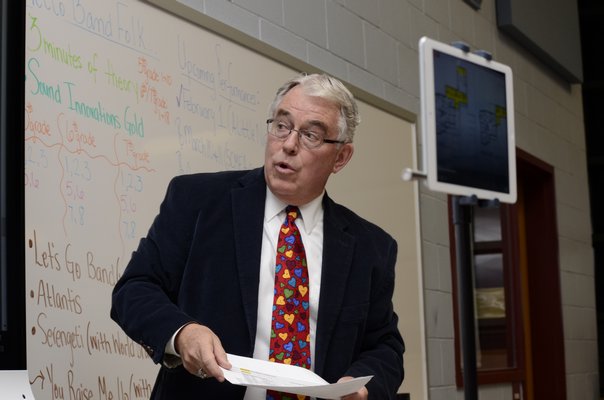
Southampton School Board members voted Tuesday to designate the second Monday of October—traditionally recognized as Columbus Day—as Indigenous Peoples’ Day for the 2018-19 school calendar, although the board was split on the measure.
Despite requests from the public to put the vote off to allow for more public input, board members voted, 4-2, in favor of the Indigenous Peoples’ Day designation. Board members Roberta Hunter, Anastasia Gavalas, Don King and SunHe Sherwood-Dudley voted for the measure, while James McKenna and Jacqueline Robinson were opposed.
Superintendent of Schools Dr. Nicholas Dyno recommended that the board follow through with the designation after three years of marking that day on the official school calendar simply as “No School” following unsuccessful efforts in previous years to change the holiday in response to protests against Columbus Day observances.
In 2016, a group of students, supported by the members of the Shinnecock Indian Nation, asked the Southampton School Board to change the calendar to reflect the day as “Indigenous Day” rather than Columbus Day. They argued against honoring Christopher Columbus because of his mistreatment of indigenous peoples upon his arrival in the New World, and suggested instead that the day be set aside to honor the native people of the Americas. Several communities in the United States have taken similar action.
“My reason for making this recommendation at this time is the result of my desire and effort to update how American and World History is taught to our students,” Dr. Dyno said on Tuesday. “[It’s] also to provide a more accurate representation of the complexities of history, and, finally, to recognize the past and present contribution of Native Americans to our community and throughout the world.”
Dr. Dyno said more than 58 municipalities across the United States have designated the second Monday of October as Indigenous Peoples’ Day, as have universities like Syracuse University and many SUNY schools. He noted that 12 Native American tribes originated in New York, and eight tribes in the state, including the Shinnecock Indian Nation, are federally recognized.
Eight percent of the students in Southampton schools are Native American, Dr. Dyno added, and the district was the first in the state to appoint a Native American principal, Cookie Richard, who has retired.
Dr. Julio Delgado, the assistant superintendent, said one of the core principles in the district is to “be who we are in our locality,” adding that there is no place in the district for stereotypes.
But not everyone in the room appreciated the motion to remove Columbus Day.
Mr. McKenna said he believes the system is flawed, and suggested a solution of having both Columbus Day and Indigenous Peoples’ Day on the school calendar.
He went on to say he was torn by the decision, because as he watched coverage of historic statues of war generals and Columbus being taken down across the country, he wondered what was next.
“Jefferson had slaves—where does he fit into the discussion?” Mr. McKenna asked. “I really don’t think this is about the Shinnecock Nation and where they fit in.”
Mr. McKenna also noted that Columbus Day is a federal holiday, suggesting that the decision should be made at that level instead of at the school district level.
As a member of the Knights of Columbus, Mr. McKenna said, he believes it is important to think about how the district approaches things, adding that he was concerned that the district did not reach out to the public completely to find out where it stands.
Mr. McKenna noted that some students are losing a holiday and others are gaining one. “No one wins when someone loses,” he added.
Ms. Hunter, a member of the Shinnecock Indian Nation, disagreed.
“It’s very interesting to say, ‘No one wins when someone loses,’” the School Board president said. “I’d like to see that analysis played out in the teaching of much of the United States history … because, clearly, there were many losses to the many wins that we do celebrate in this great nation.
“This district is within the territory of its original people … the Shinnecock Nation. This is the territory of the Shinnecock Nation—and that is fact,” she added.
Lorell Tutt, a resident of Southampton, said she was appalled by the measure, noting that Columbus was a man of his time and he changed history.
Joan Tutt of Southampton also voiced her opposition to the move: “What I am seeing in this district disgusts me and disappoints me.”
She reminisced about a time when she was in first grade and she learned “1492, Columbus sailed the ocean blue.” Back then, she said, she took Ivory soap to class and carved the Nina, Pinta and Santa Maria.
“My, how things have changed,” Ms. Tutt said. “I am offended. I am offended this topic came up.”
When the issue was first raised in 2016, the School Board adopted a generic calendar for 2016-17 that designated only the days when school was in session. It omitted not just Columbus Day but all other holidays as well.
In February 2017, the School Board voted to approve a “culturally sensitive” calendar for the 2017-18 school year, one that purposely omitted religious holidays. That earned backlash as well. But in July 2017, the board added holidays back to the calendar, but omitted Columbus Day, only labeling it a holiday.